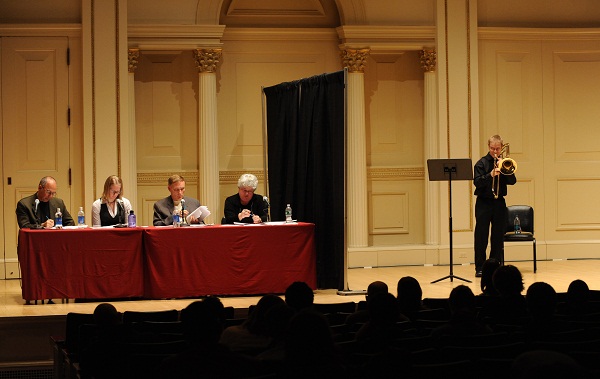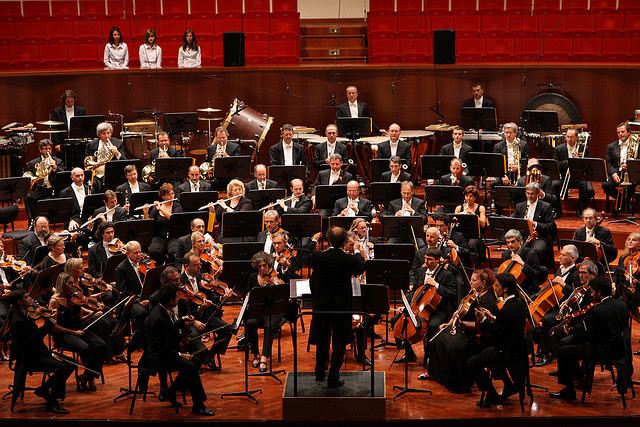What’s the starting point for creating a successful career in today’s music world? To me, it’s having the mindset of success. I define mindset as your attitude and how you perceive the world based on your experiences: how you feel about your ability to translate your musical talent into a successful career as opposed to the FACT of what instrument …
Mock Auditions at the Yale School of Music: A Rich Growth Experience for Music Entrepreneurs
Last week, students at the Yale School of Music were treated to an extraordinary experience: mock orchestral auditions with a panel of 3 world-class musicians: Maestro Peter Oundjian, Music Director of Toronto Symphony and former first violin of the Tokyo String Quartet, and two professors from the Yale School of Music, William Purvis (French Horn) and Robert Van Sice (Percussion). Nine brave student …
Managing the Downturns: 4 Happiness Strategies for Coping with Challenge
” Life is what happens to you while you’re busy making other plans.” – John Lennon This summer, I planned to take it a bit easier. I scheduled a few teaching engagements, intended to concentrate on the piano, and planned a trip to California to meet my new baby grandson. The rest of the time was going to be devoted to …
Managing Audition Rejection: How Music Entrepreneurs Keep Going
This is the season when music students are hearing about the results of their auditions: from graduate schools, fellowships and summer programs, as well as professional orchestra and other ensemble auditions. With so much competition for a limited number of spots, rejection is a common phenomenon. In two of my recent coaching groups at the Yale School of Music, we went …
Conversation with David Lang: Creativity, Entrepreneurship and What it Means to be an Artist in the 21st Century
Last week, I initiated a new program at the Yale School of Music featuring important thought leaders around Yale to open up a conversation on the arts in the 21st Century. For our first program, I had the pleasure to interviewing my friend and colleague, composer David Lang, along with 3 students at the Yale School of Music, for …
Fighting Your Way To The Top: 5 Ways to Manage Inner Conflicts
We live in a complicated, interesting world today where many in the classical music world are wringing their hands because of perceived lack of opportunities for making a successful career, while others (myself included) view our world today as one of tremendous possibility and opportunity.
This is one of the reasons that I am so passionate about teaching musicians how to look at the world as one of opportunity. One of my objectives is to help my students adopt a positive attitude towards their lives and their careers since I believe very strongly that happiness and optimism breed success and not vice-versa!
Optimism is also essential to the mindset of the music entrepreneur of the 21st Century.
In my class, we start by examining the different attitudes that one can bring to a music career. This attitude is formed by past experiences and perceptions and it translates into energy:
• stressful energy for things that make you feel hopeless, fearful, angry, or conflicted or
• motivating energy that makes you feel that you can manage your life, inspires you to keep moving forward, be of service and find opportunity.
How Happiness Breeds Success: 5 Tips to Enhance Your Career Success
For those who know me, it should come as no surprise that positivity is one of signature strengths (under the StrengthsFinder 2.0 strengths assessment), something that I am truly grateful for. So when I learned that there was a branch of study called positive psychology, I was most intrigued to find out more.
Positive psychology, a field that emerged in the 1980’s, is the scientific study of what makes people thrive and excel. Simply put, it is the science of what makes us happy.
Happiness is often defined as “subjective well-being”, involving pleasure, engagement and finding meaning in life. This can include:
• Realizing that you have the capacity to change
• Experiencing fulfillment
• Joy in striving towards your potential
Happiness comes along with a positive mindset that looks at the world through the lens of learning and opportunity. For professional musicians, cultivating a positive mindset is an essential element of music entrepreneurship. Let’s take a closer look at how the science of happiness can help musicians to create greater career success.
Networking for Music Entrepreneurs: Using Your Head and Your Heart
I love teaching networking because it is such a valuable skill for musicians. And my recent networking class at Yale was such a treat because for the first time ever, I had a group where nearly half of the students enjoy networking! As a result, my “experienced” networkers were able to share their successes with their colleagues which both reinforced the importance of networking and showed other students what to do in order to incorporate networking into one’s arsenal of career-building tools.
The bottom line: networking involves both your head—being strategic—and your heart-being intuitive and sensitive to building quality relationships.
Let’s take a closer look at what worked.
How to Develop the Mindset of a Music Entrepreneur: 5 Tips on Positivity
I was quite taken with a recent blog post in Music Career Juice on how musicians should not look to businesses as a model for how to operate but instead to aspire to be expressive energy grids – generating, transforming and distributing energy continually. Since I teach musicians how to create career success, this got me thinking more about the kind of energy that one brings to a situation in order to be successful.
We have all heard about “negative” and “positive” energy. Think of what it is like to be surrounded by a group of people who complain and bemoan the state of the world, which we hear a lot of these days in the world of the arts: orchestras like Philadelphia declaring bankruptcy, fewer spots available in orchestras, the weak economy. I could go on but I don’t want to add to the doom and gloom! That’s what negative energy can do-bring you down. And because energy is transferred, if enough people in the room are spinning out negativity, it tends to drag down others.
Let’s look at another scenario:
Listening: An Essential Communication Skill for Musicians
I have been attending a lot of chamber music concerts lately and have been observing how important it is for musicians to listen to each other as they perform. The better the members of an ensemble are able to listen and communicate effectively to each other, the better the performance. This has gotten me thinking about ways that musicians can …
- Page 1 of 2
- 1
- 2




